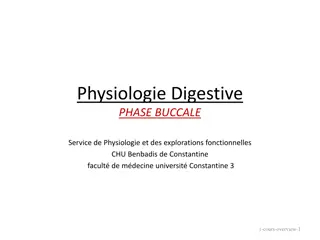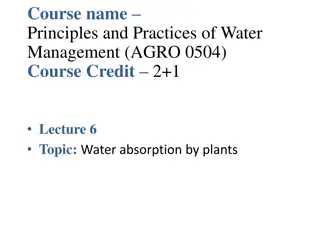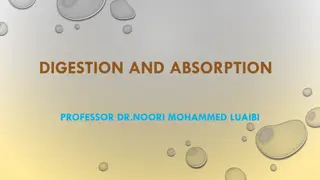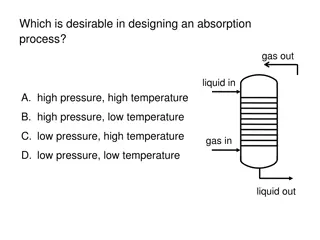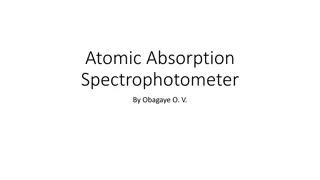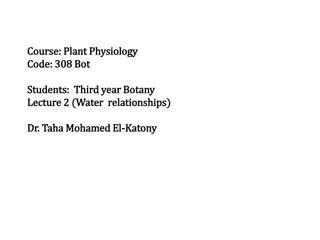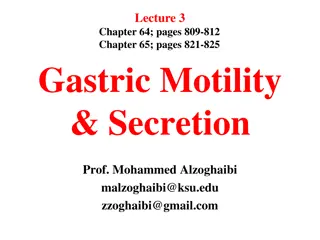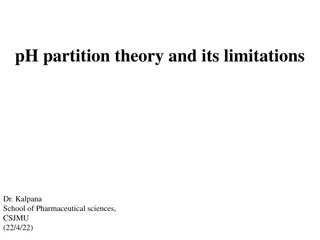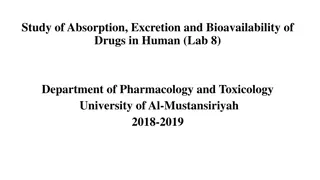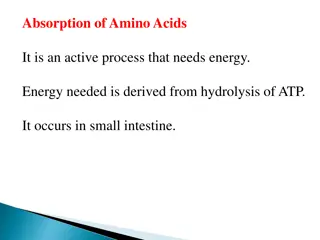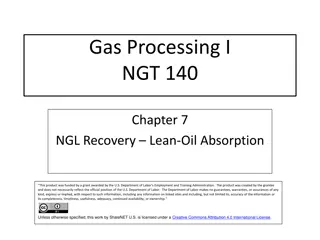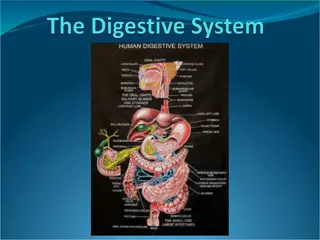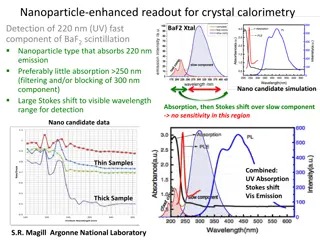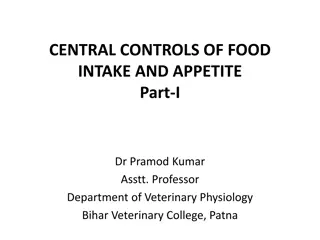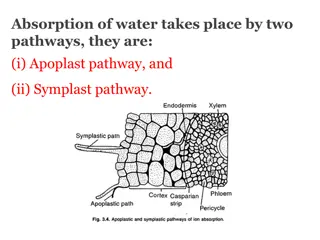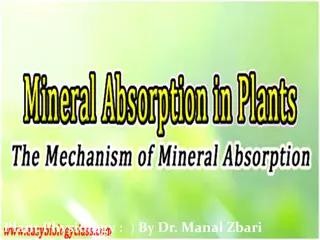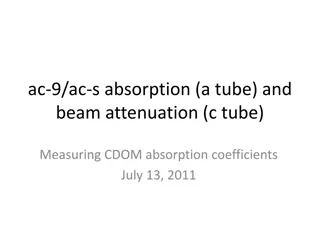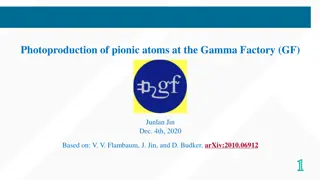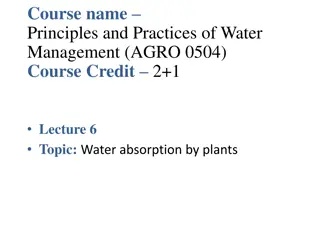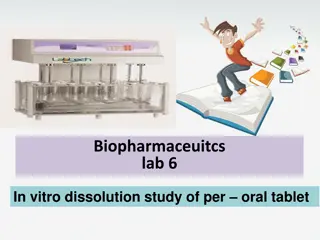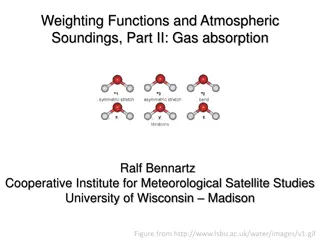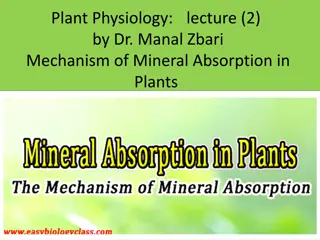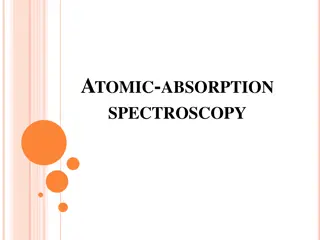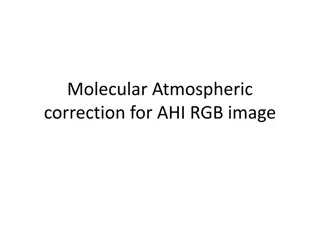ASPEN Staged Separation Unit-Ops
Introduction to Aspen Staged Separation Unit Operations for the purification of desired components by removing impurities and pollutants using distillation, absorption, and stripping columns. This technology is relevant to ammonia synthesis to prevent catalyst poisoning by removing CO2 through absor
0 views • 26 slides
Physiologie Digestive PHASE BUCCALE
Digestive physiology involves the breakdown of food into simple nutrients for absorption by the body. It includes mechanical and chemical means of food degradation using enzymes from salivary, gastric, pancreatic, and colonic bacteria. The digestive system comprises the mouth, esophagus, stomach, li
4 views • 25 slides
Understanding Water Absorption in Plants: Mechanisms and Implications
Exploring the intricate process of water absorption in plants, this course delves into the active and passive methods used by roots to uptake water from soil, the role of osmosis in osmotic active absorption, the influence of transpiration on passive absorption, and the significance of root hairs in
1 views • 26 slides
Anatomy of Intestine in Domestic Animals
The intestine in domestic animals plays a vital role in digestion and absorption. It consists of the small intestine for chemical digestion and absorption and the large intestine for water absorption and excretion. This article covers the gross anatomy, histology, and embryology of the intestine, de
2 views • 84 slides
How are plant essential oils valuable as functional ingredients
Food Research Lab is one of the leading food industry consultants and offers various food production services. We provide food production and food manufacturing consultancy services to food, beverage and nutraceutical companies. Primary food production involves everything from food procurement, inve
8 views • 12 slides
Understanding Digestion and Absorption in the Gastrointestinal Tract
Digestion and absorption in the gastrointestinal tract are crucial processes for breaking down carbohydrates, fats, and proteins into smaller compounds that can be absorbed by the body. Carbohydrates undergo hydrolysis to convert into monosaccharides, fats are broken down from triglycerides, and pro
1 views • 22 slides
Understanding Absorption Processes and McCabe-Thiele Analysis
Desirable conditions in designing an absorption process include low pressure and high temperature for the gas in and liquid out. Learn about appropriate plots, points on the operating line, absorption factors, minimum absorbent usage, assumptions in McCabe-Thiele analysis, and differences between co
3 views • 14 slides
Understanding Absorption Costing and Overhead Absorption in Cost Accounting
Absorption costing is a method that includes direct costs and a fair share of production overhead costs in the cost of a product. Overhead absorption rate (OAR) is calculated using budgeted figures and can lead to over/under-absorption. Over-absorption occurs when absorbed overhead is more than actu
1 views • 23 slides
Understanding Atomic Absorption Spectrophotometry in Analytical Chemistry
Atomic absorption spectrophotometry (AAS) is a spectro-analytical technique used for quantitative determination of chemical elements through the absorption of light by free atoms. This method is vital in various fields like biophysics, toxicology, and archaeology, allowing the analysis of over 70 di
0 views • 9 slides
Enhancing CO2 Absorption Through Prioritizing Agriculture in UNFCCC Deliberation
COP 24 aims to address the challenges of global warming but faces obstacles in reducing CO2/GHG emissions. Emphasizing agriculture as a key solution due to its CO2 absorption capabilities can lead to breakthroughs. Implementing measures like modern technology in agriculture and promoting initiatives
1 views • 12 slides
Understanding Water Absorption in Plant Root Systems
Absorption of water by plant roots is a crucial process involving osmosis and gradients. The root system structure plays a vital role in water absorption efficiency, with root hairs being key to this process. Factors such as soil penetration depth and root hair characteristics impact the extent of w
0 views • 21 slides
Understanding Gastric Motility and Secretion in the Stomach
The stomach plays a crucial role in food processing, acting as a reservoir, preparing chyme for digestion, and facilitating absorption. Divided anatomically and physiologically, it functions as a storage unit and mixing chamber for food. Key motor functions include storage, preparation for digestion
0 views • 49 slides
Understanding Biopharmaceutics: pH Partition Theory and Drug Absorption
Biopharmaceutics explores how drug properties and administration methods impact drug absorption. Factors affecting oral absorption include membrane physiology and drug partitioning based on pH levels. The pH partition theory, explained by Brodie et al., highlights the role of drug lipid solubility a
0 views • 9 slides
Food Equipment Usage Guidelines for Safe Food Handling
Enhance your knowledge on using equipment for making food with proper safety procedures. Learn about essential points like wearing protective gear, checking hot food temperatures, food safety principles, and sanitization requirements. Understand machine settings, food temperature checks, and serving
1 views • 22 slides
Understanding Drug Absorption, Excretion, and Bioavailability in Humans
Delve into the complex processes of drug absorption, excretion, and bioavailability in the human body. Learn about the various factors affecting drug absorption from the gastrointestinal tract, including biological, physiochemical, and pharmaceutical factors. Explore the mechanisms of drug transport
0 views • 24 slides
Amino Acid Absorption Mechanisms in Small Intestine
Amino acid absorption in the small intestine is an active process requiring energy derived from ATP hydrolysis. It involves two main mechanisms: carrier proteins transport system and glutathione transport system. The carrier proteins transport system uses ATP energy for absorption, while glutathione
0 views • 18 slides
National Food Reserve Agency (NFRA): Enhancing Food Security in Nigeria
The National Food Reserve Agency (NFRA) under the Federal Ministry of Agriculture & Water Resources plays a crucial role in addressing agricultural production, storage, and marketing challenges in Nigeria. With a vision to ensure sustainable food access for all Nigerians and become a global food pro
1 views • 30 slides
Lean Oil Absorption Process in Gas Processing
The Lean Oil Absorption process in gas processing involves using hydrocarbon-rich lean oil to absorb heavier hydrocarbons from natural gas, allowing for increased gas condensate recovery. This method is a cost-effective way to separate different products in natural gas, alongside refrigeration proce
1 views • 14 slides
Exploring Food Science and Technology in Modern Society
Delve into the world of food science and technology with insights on what scientists do, the importance of understanding food, definitions of food science and food technology, factors affecting food spoilage, and traditional and modern food processing technologies. Gain knowledge on testing hypothes
0 views • 22 slides
Understanding the Human Digestive System: A Comprehensive Overview
The digestive system plays a vital role in breaking down food into nutrients for absorption. This process involves stages like ingestion, digestion, absorption, and egestion. Beginning with the mouth, food moves through the esophagus, stomach, and small intestine for digestion and absorption of nutr
0 views • 21 slides
Nanoparticle-Enhanced Readout for Crystal Calorimetry: BaF2 Scintillation Detection
Nanoparticles with specific absorption and emission properties are explored to enhance the readout process for BaF2 crystal calorimetry, focusing on detecting the fast 220nm UV component. The goal is to achieve a large Stokes shift to the visible wavelength range for efficient detection, while minim
0 views • 7 slides
Understanding the Central Controls of Food Intake and Appetite in Animals
Nutrition is essential for animal health and growth, with food nutrients being the main energy source through digestion and absorption processes. The regulation of animal nutrition involves various tissues and organs. Animals acquire nutrients through specialized digestive systems, breaking down foo
0 views • 14 slides
Water and Mineral Absorption Pathways in Plants
Water absorption in plants occurs through two pathways - the apoplastic pathway and the symplastic pathway. Mineral salt absorption is a separate process, happening mainly in the meristematic regions of roots. Root cells selectively absorb ions through ion exchange, which is energetically favorable.
0 views • 13 slides
Mineral Absorption in Plants: Mechanisms and Types
Plants absorb minerals from the soil as ions through the roots, with the process of mineral absorption being distinct from water absorption. Mineral absorption in plants can occur through passive or active methods, each involving different mechanisms and energy requirements. Passive absorption is a
0 views • 14 slides
Comparison of CDOM Absorption Coefficients Using Different Filters and Instruments
This study conducted on July 13, 2011, analyzed the absorption coefficients of CDOM using various filters and instruments in different sample sources like open ocean, dockside, and Biscay pond dilution series. The comparison included measurements with ac-9 and ac-s filters of varying sizes, along wi
0 views • 11 slides
Mastering Good Food Hygiene and Storage Practices
Understanding food spoilage causes, common food-poisoning bacteria, conditions for bacterial growth, ways to prevent food contamination, safe food handling practices, HACCP concept, types of perishable foods, importance of proper food storage, packaging materials for food, and recognizing signs of f
1 views • 27 slides
Understanding Refrigeration Cycles and Equipment
Explore the fundamentals of mechanical and absorption refrigeration, refrigerant heat absorption and rejection, compressor types, condensers, expansion devices, evaporators, and the operation of absorption refrigeration cycles. Learn about refrigeration capacity, refrigerants, halogen refrigerants,
0 views • 43 slides
Photoproduction of Pionic Atoms at the Gamma Factory: Research Overview
Research conducted by V. V. Flambaum, J. Jin, and D. Budker at the Gamma Factory (GF) on photoproduction of pionic atoms is detailed in this content. It explores the formation of pionic atoms with negative pions orbiting the nucleus in a hydrogen-like system, emphasizing strong interaction effects a
0 views • 11 slides
Water Absorption by Plants: Mechanisms and Adaptation Strategies
Understanding water absorption by plants is crucial for effective water management in agriculture. Plants absorb water through active and passive methods, driven by osmotic and non-osmotic processes. Root hairs play a significant role in facilitating water uptake, with mechanisms such as osmotic act
0 views • 26 slides
In Vitro Dissolution Study of Per Oral Tablet: Understanding Drug Absorption
Dissolution is a crucial process for drug absorption, where solid dosage forms must dissolve in gastrointestinal fluid before absorption. Factors affecting dissolution rate include agitation intensity, drug solubility, and surface area exposed to the dissolution medium. Dissolution testing plays a k
0 views • 12 slides
Understanding Ionospheric Absorption Laws and Regions
The principles of the ionosphere at middle and low latitudes, Lambert-Beer exponential absorption law, and characteristics of E and F regions are discussed. The absorption of solar radiation, recombination reactions in different regions, and ionization processes are highlighted, providing insights i
0 views • 15 slides
Understanding the Absorption of Companies: Types, Objectives, and Accounting
Exploring the concept of absorption of companies, this content delves into various aspects such as types of amalgamation/absorption, objectives of the process, AS 14 accounting standards, and differences between pooling interest method and the purchase method. It also highlights the key accounts inv
0 views • 10 slides
Understanding Light Absorption by Chlorophyll in Biology
Explore how chlorophyll absorbs light in photosynthesis, the role of different types of seaweeds, and the use of spectrometers to measure light absorption. Discover the specific light regions absorbed by chlorophyll A and B, as well as adaptations in seaweeds for varying light intensities. Learn abo
0 views • 9 slides
Gas Absorption and Atmospheric Soundings: Principles and Applications
Gases in the atmosphere absorb radiation through various mechanisms such as changing rotational/vibrational energy and exciting electrons. This absorption plays a crucial role in remote sensing applications. The absorption principles differ for molecules like CO2 and H2O, influencing their vibration
0 views • 9 slides
Mechanism of Mineral Absorption in Plants: Active vs Passive Methods
Plants absorb minerals from the soil in the form of inorganic ions through both passive and active methods. Active mineral absorption requires metabolic energy, whereas passive absorption occurs along the concentration gradient by simple diffusion. The roots play a vital role in mineral absorption d
0 views • 14 slides
Understanding Food Justice and Insecurity: A Comprehensive Overview
Food Justice Primer provides insightful definitions and discussions on key concepts such as food justice, food insecurity, food sovereignty, and food deserts. It highlights the need for equitable sharing of benefits and risks in the food system, aiming to transform current disparities and inequities
0 views • 49 slides
Understanding Atomic Absorption Spectroscopy in Analytical Chemistry
Atomic absorption spectroscopy (AAS) is a valuable technique for determining metal concentrations in samples. This method involves the absorption of light to measure gas-phase atoms, requiring steps like desolvation, vaporization, and volatilization to convert samples into atomic gas. The process ut
0 views • 18 slides
Near-UV Satellite Observations for Retrieving Aerosol Properties
Near-UV satellite observations offer a valuable method for retrieving aerosol properties, including aerosol optical depth, absorption, layer height, and surface albedo. These observations provide advantages like sensitivity to aerosol properties and negligible gas absorption interference. However, c
0 views • 16 slides
Understanding Business Amalgamation, Absorption, and Reconstruction
Business combination through amalgamation, absorption, or reconstruction is a strategic move driven by competition. Amalgamation involves merging companies, absorption is one company purchasing another, and reconstruction forms a new entity. Legal provisions facilitate these processes, with vendor a
0 views • 25 slides
Atmospheric Correction Techniques for Satellite Image Enhancement
Atmospheric correction is essential for improving the quality of Remote Sensing images captured by satellites. This process involves correcting for the effects of atmospheric gases such as scattering and absorption on the measured Top-of-Atmosphere (TOA) reflectance. Techniques like molecular correc
0 views • 8 slides

